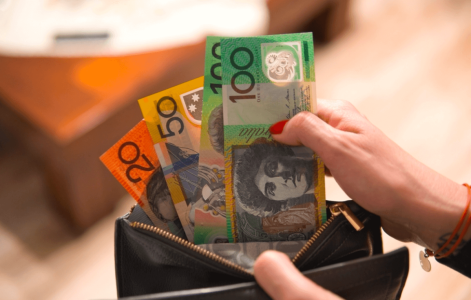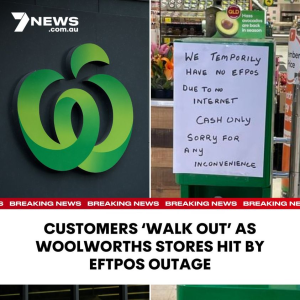Australia inches towards 'cashless future' as currency notes decline for the first time in nearly six decades
- Replies 43
The world is constantly evolving, especially with the advancements in technology. These innovations have led to the creation of numerous online tools, apps, and resources that aim to make our lives more convenient and straightforward.
However, amidst all these changes, have you ever considered how this shift in our lifestyle is influencing our finances?
Interestingly, a recent report commissioned by the Reserve Bank of Australia has highlighted that Australia is steadily moving towards becoming a cashless society.
This means that physical currency like coins and notes are being used less frequently in favour of digital transactions. And this transition might have a more significant impact on our lives than originally thought.

According to a recent survey, the number of notes in circulation had experienced a significant drop for the first time since 1966, back when pounds and shillings were replaced by decimal currency. This decline is particularly noticeable in the case of $50 notes and has resulted in over a billion dollars in physical cash vanishing from circulation.
Around one-third of Australians now identify themselves as 'low cash users', indicating a shift towards digital and electronic payment methods.
While this trend may reflect modern convenience for some, it could potentially create challenges for certain societal groups. Specifically, people living in regional areas and the elderly, who rely heavily on cash for their day-to-day transactions, may face difficulties due to the reduced availability of cash.
During the pandemic, people showed a preference for digital payments, but surprisingly, the use of cash actually increased. However, as we fast forward to the present day, it's becoming evident that cash is losing its popularity again.
The Reserve Bank of Australia (RBA) reports that the total amount of cash circulating in the country is now at just over $101.3 billion, the lowest since November 2019. The number of $5, $20, and $50 notes in circulation has decreased, with the $50 note experiencing the most significant decline. The $100 note is the only one that has seen a slight increase, though even this growth is slowing down.
While cash has been losing its charm, there are various other convenient payment methods that have been gaining traction.
Contactless systems like Apple Pay have been on the rise, offering a quick and easy way to make transactions. Additionally, physical cheques are gradually being phased out and are expected to be extinct in Australia by 2030.
The topic of Australia's increasing shift towards cashless transactions among retailers has been a subject of intense debate. This trend has not only sparked discussions on social media but also within the SDC forum.
We've covered this matter in several articles, which you can read by following the links below:

Members, we'd love to hear your thoughts on the apparent decline in cash usage in Australia. Do you see this as a positive or negative development? Should retailers and establishments still prioritise cash transactions? Drop your comments below, and let us know what you think!
However, amidst all these changes, have you ever considered how this shift in our lifestyle is influencing our finances?
Interestingly, a recent report commissioned by the Reserve Bank of Australia has highlighted that Australia is steadily moving towards becoming a cashless society.
This means that physical currency like coins and notes are being used less frequently in favour of digital transactions. And this transition might have a more significant impact on our lives than originally thought.

Australia is moving towards a cashless society as the number of circulating notes declines for the first time since 1966. Credit: Shutterstock.
According to a recent survey, the number of notes in circulation had experienced a significant drop for the first time since 1966, back when pounds and shillings were replaced by decimal currency. This decline is particularly noticeable in the case of $50 notes and has resulted in over a billion dollars in physical cash vanishing from circulation.
Around one-third of Australians now identify themselves as 'low cash users', indicating a shift towards digital and electronic payment methods.
While this trend may reflect modern convenience for some, it could potentially create challenges for certain societal groups. Specifically, people living in regional areas and the elderly, who rely heavily on cash for their day-to-day transactions, may face difficulties due to the reduced availability of cash.
During the pandemic, people showed a preference for digital payments, but surprisingly, the use of cash actually increased. However, as we fast forward to the present day, it's becoming evident that cash is losing its popularity again.
The Reserve Bank of Australia (RBA) reports that the total amount of cash circulating in the country is now at just over $101.3 billion, the lowest since November 2019. The number of $5, $20, and $50 notes in circulation has decreased, with the $50 note experiencing the most significant decline. The $100 note is the only one that has seen a slight increase, though even this growth is slowing down.
While cash has been losing its charm, there are various other convenient payment methods that have been gaining traction.
Contactless systems like Apple Pay have been on the rise, offering a quick and easy way to make transactions. Additionally, physical cheques are gradually being phased out and are expected to be extinct in Australia by 2030.
The topic of Australia's increasing shift towards cashless transactions among retailers has been a subject of intense debate. This trend has not only sparked discussions on social media but also within the SDC forum.
We've covered this matter in several articles, which you can read by following the links below:
- Controversial statement on Aussie motorist's car draws attention, sparks 'cashless society' debate
- Why cash still matters: Woolworths incident sparks debate on cashless society
- Is going cashless taking away your freedom? Find out how businesses face consumer boycotts
Key Takeaways
- Australia is on its way to becoming a cashless society, with the number of notes in circulation declining for the first time since dollars and cents were introduced in 1966.
- RBA's consumer payment survey shows one-third of Aussies now identify as 'low cash users', indicating a shift towards digital and electronic payment methods.
- Despite an uptick in cash usage during the pandemic years, the overall trend towards electronic payment methods has seen a decrease in cash circulation, currently standing at just $101.3 billion.
- The use of cash is expected to continue to diminish over the coming years, similar to cheques, which are expected to completely cease in the country by 2030.
Members, we'd love to hear your thoughts on the apparent decline in cash usage in Australia. Do you see this as a positive or negative development? Should retailers and establishments still prioritise cash transactions? Drop your comments below, and let us know what you think!








